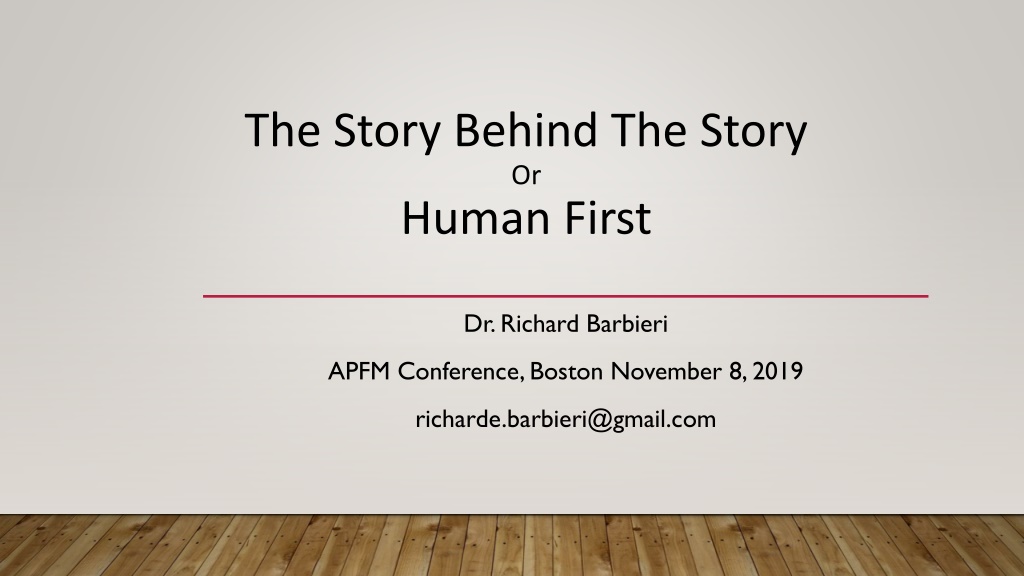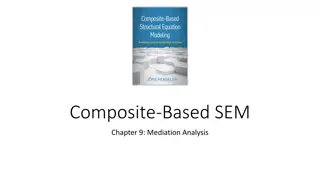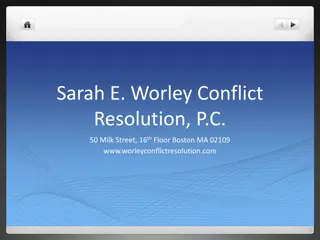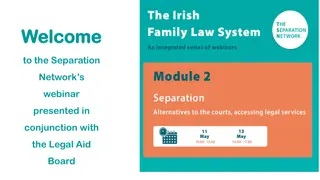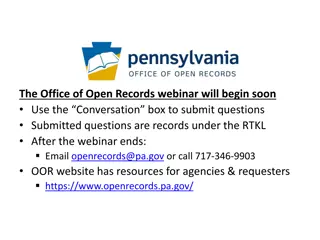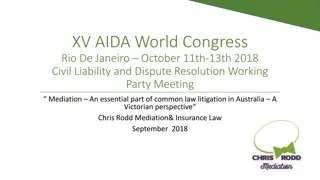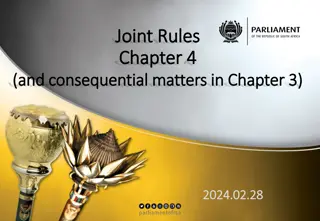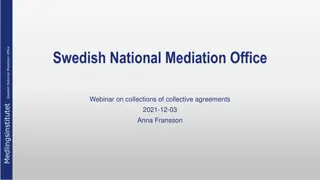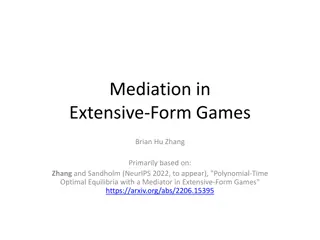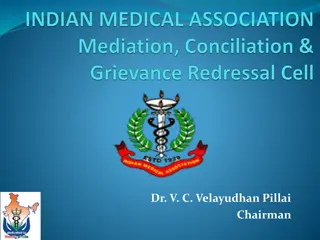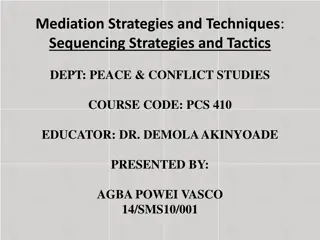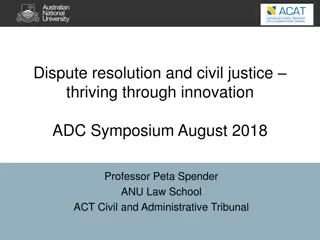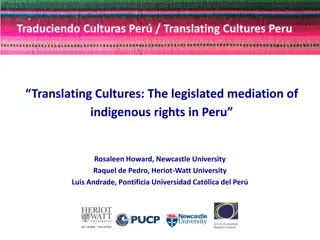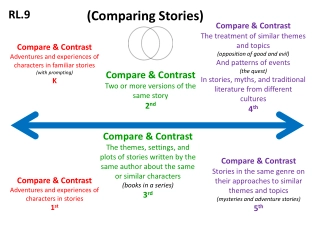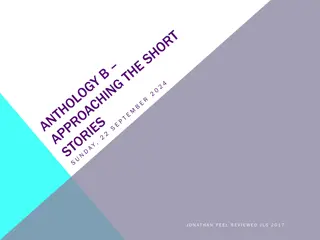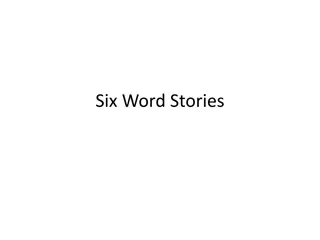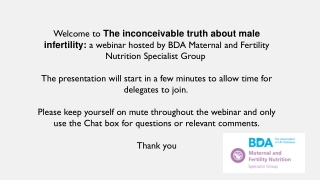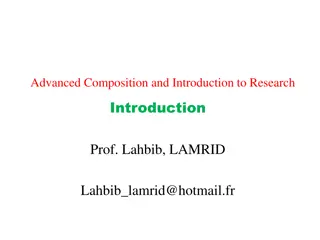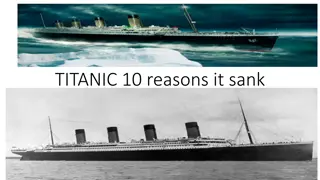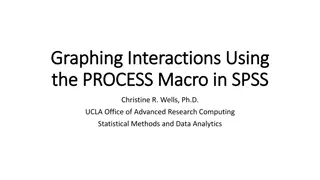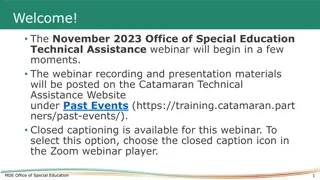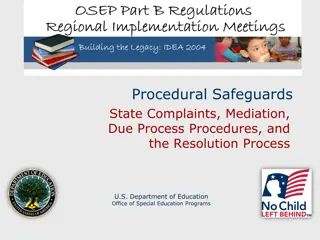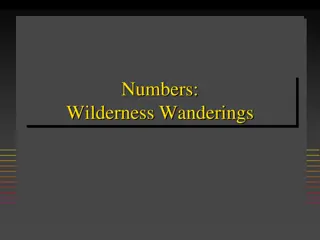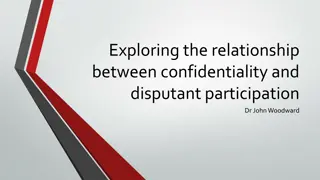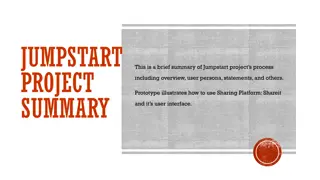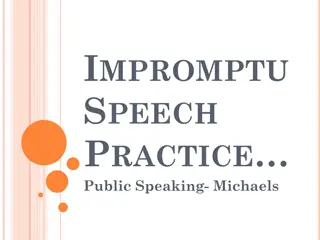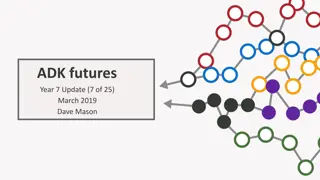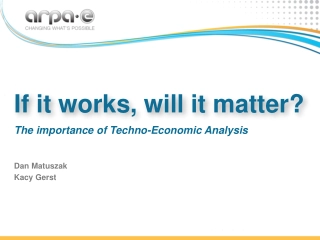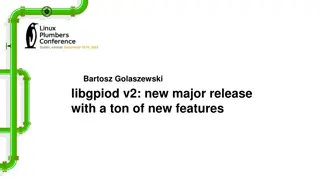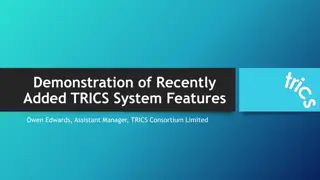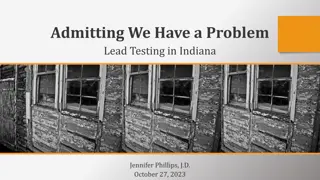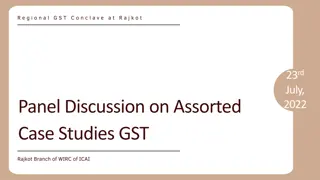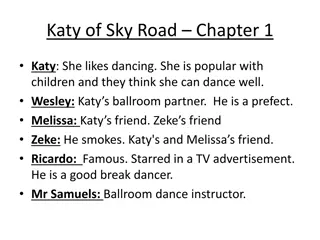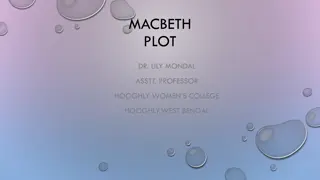Stories Unveiled: Insights from Mediation Scenarios
Delve into captivating mediation stories where hidden complexities surface, showcasing the intricacies of human relationships. From disputes between former colleagues to unexpected revelations in divorce proceedings, each tale reveals the nuanced dynamics at play within individuals seeking resolution.
Download Presentation

Please find below an Image/Link to download the presentation.
The content on the website is provided AS IS for your information and personal use only. It may not be sold, licensed, or shared on other websites without obtaining consent from the author. Download presentation by click this link. If you encounter any issues during the download, it is possible that the publisher has removed the file from their server.
E N D
Presentation Transcript
The Story Behind The Story Or Human First Dr. Richard Barbieri APFM Conference, Boston November 8, 2019 richarde.barbieri@gmail.com
All Happy Families are Alike Each Unhappy Family is Unhappy in its Own Way Leo Tolstoy, Anna Karenina
MY COMMITMENTS Anecdotes * Artistic Representations * Interpersonal Theory *From the Presenter and the Participants
I. The Stories 1. My First Mediation Not All Fathers Are Biological II. An Easy Divorce III. Too Much Information IV: Doth The Lady Protest Too Much?
1. My First Mediation Not All Fathers Are Biological Tom is a trucking company owner, in his late 50s. Bill, in his 30s was previously a driver for Tom. Tom has fired Bill and is in court demanding that Bill pay for damage to one of the trucks. Bill has brought a woman with him, which makes Tom angry Tom explains the damage, but then tells us Bill had been a great driver, and once avoided what could have been a fatal accident by his skill. He mentions all the ways he and Bill had worked together, above and beyond the job, and how had often helped Bill out with personal problems. Bill tells us about the good relationship he and Tom had had and he had done a lot for Tom. He denies having done anything to the transmission. Speaking again, Tom shows us a newspaper article about Bill s arrest on drug charges and explains how he helped Bill. He also tells us Bill is divorced, is now with the woman he brought, and is not paying his child support. WHAT IS THE STORY BEHIND THE STORY?
II. An Easy Divorce Ed and Edna arrive for their first mediation. Ed is a mechanic, Edna a clerk in a local government office. They explain they have things pretty much settled, and just need help with finances. But as we talk the details gradually come out: They have a son with developmental problems who needs a special program The son has been enjoying playing Little League. The coach and the coach s son, who is a late teen, have been very supportive. In fact, the son is ow living with Ed, Edna, and the boy. Edna is having an extramarital relationship with the coach Finally, when the issue of custody, and travel come out, Joe blurts: If she wants to take the kid with that peckerwood it s fine with me. What s your job as a mediator? What job will you take on?
III. TMI The couple had been together for years, but this breakup seemed final They owned a retail business together: He managed the site, she did the books. They were seeking a way to continue the business, but neither trusted the other. The first meeting led to a plan to find a third party to do the work in question (banking, receipts, etc.) The next meeting was set for two weeks later. Soon after an e-mail exchange between them and with the mediators began. He: I don t want her in the store She: I need to be there; he s there all the time; he even lives over the store He: I don t care; she can t be in the store She: Then who s going to supply him with his drugs? What s Your Next Move?
IV: Doth The Lady Protest Too Much? The couple have been together for many years. He wants a divorce, she is openly reluctant. They operate a very unusual business, which provides their only income. She is a passive partner; he has the skill set. He also is having a personal relationship with an employee. He offers every plan he can think of to keep the business and support her. He appears solicitous. His refrain is I don t want to take anything from you except me. She questions each proposal, partly because of the emotional entanglement, but also because, in her repeated words, He s so mean to me and I can t trust him to do what he says. She vacillates between accepting then rejecting every proposal. After 5 months of often-delayed sessions, She is asked if she has any ideas. She replies : I could buy the business from him. Knowing the couple has no assets aside from the house she lives in and the the heavily indebted business that brings in their living, the mediators ask how she might do that. She suggests her ability to find a fraction of the needed funds and is asked where the rest might come from. She bursts into tears, calls them mean, and flees the room. The mediation ends. What is the Real Story? Whose Is It? Will You Ever Know?
Artistic Representations Novels Movies Plays Poetry
WHY READ? WHY FICTION? Small doses of fiction encourage empathy as well. In one study, people who read George Saunders s The Tenth of December [a volume of short stories] later identified others feelings more accurately than people who had read nonfiction If reading one passage of fiction (or one book) creates a tiny increase in empathy, a lifetime of doing so might create a larger difference Jamil Zaki, The War for Kindness Works of fiction draw on our skills of empathy and allow us to practice these skills. Then not only do they extend our individual experience, but they can become topics of discussion with others, who can show us even further implications of our emotions than what we had perceived ourselves. Keith Oatley, A Feeling For Fiction inThe Compassionate Instinct: The Science of Human Goodness
MaryGordon, Roots of Empathy: Changing the World Child by Child Michele Borba, UnSelfie: Why Empathetic Kids Succeed in Our All-About-Me World literary fiction not nonfiction is what science says is better at nurturing empathy, perspective taking, and appreciating and understanding those not like us (or what I call otherness. ) Studies show that students involved in programs designed to increase empathy have stronger scores in higher-order reading comprehension than comparison students. Other studies have confirmed that training in empathy enhances both critical skills and creative thinking empathizing, and seeing another person s point of view than those who read nonfiction. What s more: adults who read less fiction report themselves to be less empathic. people who read fiction are more capable of understanding others, or nothing had unimpressive results, but those who read literary fiction improved significantly in their abilities to understand what others are thinking and feeling. Those gains were true though they read for only three to five minutes and if participants admitted to not enjoying reading literary fiction! Reading literature even for short periods can enhance empathy, and proof of that is showing up not only on paper-and-pencil tests, but also on images of our brains. [New School study} participants who read nonfiction, popular fiction,
ONLINE RECOMMENDATIONS HuffPost: 22 Books Everyone Should Read During Divorce 20 Non-Fiction: Dalai Lama, David Sedaris, Ekhard Tolle, Elizabeth Gilbert, Cheryl Strayed. 2 Fiction: Kate Chopin, The Awakening, Judy Blume, Are You There God? Book Riot: 23 Of The Best Divorce Books For Healing, Support & Guidance All Nonfiction: only 2 in common with HuffPost Bustle.com: 12 Books To Read That'll Make Your Divorce A Little Bit Easier Poetry, Novels, and Food Advice Amazon: 50 Womens Novels on Divorce Kevin Kwan, Crazy Rich Asians Trilogy, Ann Patchett, The Dutch House
SOME SAMPLES Hot, steamy romances with possessive bad boys, and the passionate, fiery women who love them. Swoonworthy romances from the heart!
Sharon Olds, Stag's Leap Louise Gluck I want to ask my almost-no-longer husband what it s like to not love, but he does not want to talk about it, he wants a stillness at the end of it. Unspeakable Vita Nova At the center of the self, Grief I thought I could not survive. I had two desires: desire To be safe and desire to feel He shows no anger, I show no anger but in flashes of humor, all is courtesy and horror. And after the first minute, when I say, Is this about her, and he says, No, it s about you, we do not speak of her. how will you ever again believe the love of another being? My soul withered and shrank. And when hope was returned to me it was another hope entirely. So the men are gone, and I m back with Mom. I always feared this would happen, I thought it would be a pure horror, but it s just home Telling My Mother With the smallest hearts have The greatest freedom Meadowlands Those As I add to the stash which will go to him, I feel as if I m falling away from family as if each ponderous object had been keeping me afloat. Object Loss
MOVIE QUIZ To Kill a Mockingbird Twelve Angry Men Old Yeller Lady and the Tramp The Fly E.T. Philadelphia Sleepless in Seattle Brian s Song Rudy Black Swan Flashdance Citizen Kane It s a Wonderful Life A Star Is Born Funny Girl
A Song Of Loss For Divorce Mediators Title: You Can Have the TV Composer: Craig Carnelia Performer: Karen Akers: Albums: In a Very Unusual Way ; On Stage at Wolf Trap
"You Can Have The T.V." You can have the T.V. I'll take the radio. Really, I don't want the T.V. Just please the radio I'd like that chair if you don't want it. Thank you You keep the couch, You'll need a couch. That's okay You can keep the records, Cause it's your stereo. Really, I won't need the records Without a stereo. I'd like the kitchen chairs and table. Thank you. You keep the bed, I'll buy a bed. That's okay The books we can split in half, The pots and pan we can do the same. The pictures on the wall We can split in half, And you can have the scrabble game. The money in the bank We can split in half And you can have your single name. Our friends, we can split in half, And we can each have half the blame. Ok it's settled then You can have the T.V. I'll take the radio. Really, I don't want the T.V. Just please the radio. I d like that lamp if you don't want it. Thank you. You keep the couch; you'll need a couch. That's ok You keep the bed, I'll buy a bed That's ok The dog, you keep the dog I'll come around and see him now and then .
Introduction to the Internal Family Systems Model Richard C. Schwartz Generation To Generation Edwin H. Friedman
